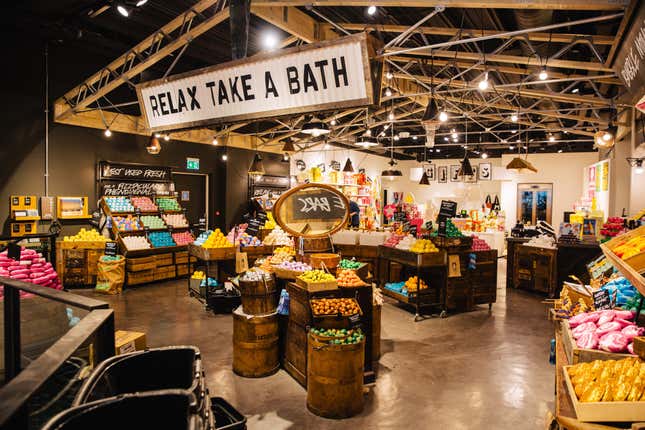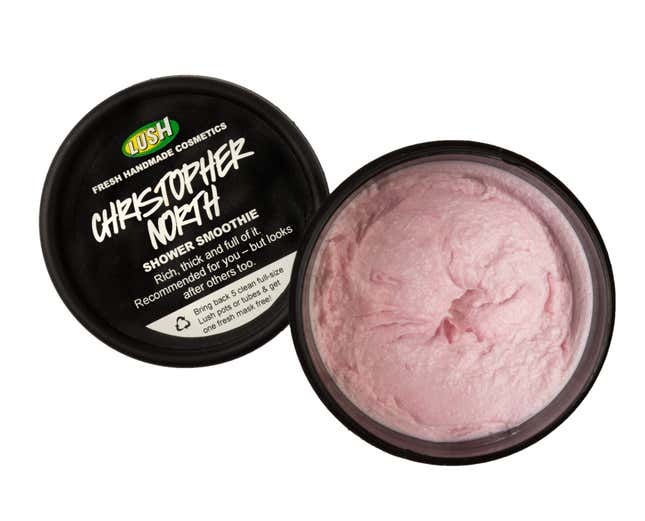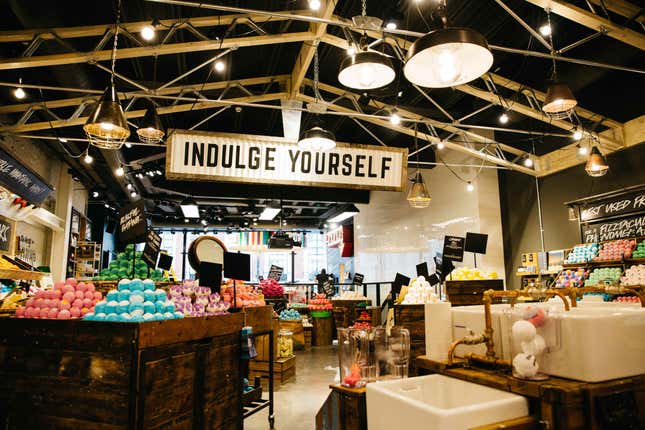The first thing most people notice about Lush is the smell.
There’s no escaping it in the shop most famously known for its candy-colored bath bombs. Cheese-shaped wedges of soap, as well as shampoo and deodorant, are nestled between black pots that boast names like “Jasmine & Henna Fluff Eaze.” The handmade products have minimal packaging, but they do bear stickers with illustrations of the smiling factory workers who made them.
The hovering staff are enthusiastic to sell not only these wares, but the joys of “living the Lush life.” The UK-based company believes in “long candlelit baths, sharing showers, massage, filling the world with perfume and the right to make mistakes.”
It also ardently believes in blockading a runway at London’s Heathrow airport to protest planned expansion, occupying Westminster Abbey to oppose cuts to disability benefits, and campaigning fiercely against border controls. Staff members once tried to board a train to France using a travel document called the “world passport.” (They failed.)
And it’s not just in the UK. The company, which generated a turnover of £574 million ($800 million) last year and a pre-tax profit of £31.3 million, now has 940 stores in 50 countries around the world. It gives financial support to activists groups making a stir in the US too. These include No New Animal Lab, which is trying to block an underground animal-testing lab at the University of Washington, and Peaceful Uprising, an environmental group that uses civil disobedience to highlight climate change.
Mark Constantine, co-founder of Lush, doesn’t shy away from his company’s association with such campaigners. These small, grassroots groups are in line with Lush’s values—protecting the environment, preserving human rights, and promoting animal welfare, he tells Quartz. They are ”concerned citizens” who are “absolutely central to what society is all about.”
So how did a for-profit cosmetics company become a huge backer of direct protest both in the UK and abroad?
Lush: The origin story
Constantine describes himself as an “intense” person growing up. If there was something he could lecture you on, he probably would. He would fast on Christmas Day to protest the holiday’s excess and then donate money to charity. His first and last vehicle was a scooter, but when he saw a friend crash one into a van, he decided to stick to a bike. (He still cycles to work.)
“I was a total pain in the butt,” Constantine tells Quartz.
He first got interested in hair and cosmetics when he was 14, and got his big break when he met Anita Roddick, the founder of the Body Shop, a rival bath-products company that was one of the first businesses to pioneer ethical consumerism. Roddick, who died in 2007, donated her entire £51 million fortune to charity.
After sending some samples to Roddick, Constantine quickly became the Body Shop’s largest supplier. Roddick would go on to buy him out in the early 90s for £6 million. Constantine and his wife Mo funneled the money into Cosmetics To Go—a mail-order company that went bust within a few years. The Constantines weren’t down for long, however. They, along with four other co-founders in 1995, put all their effort into building Lush, which luckily for them, turned into a massive hit.

Constantine was keen to build his business on the norms and values that everyone learns as a child—”try to be kind to the environment, don’t cheat, don’t lie, don’t copy, don’t steal,” he explains.
Last year, Lush paid a 47.3% effective tax on its total business (the UK corporate tax rate is 20%), according to its most recent public filings. The company says this is because it refused to take advantage of tax havens and certain schemes in a bid to pay a fair tax in each country it operates. It caps top salaries so they can’t be more than 14 times above those at the bottom. It refuses to test its handmade products on animals, or to buy from suppliers who do.
In fact, Lush’s website says, “we reserve the right to civil disobedience” if any law requires the company to test on animals. It doesn’t sell in mainland China, which requires animal testing on imported cosmetics.
Constantine is also serious about the “don’t copy, don’t steal” part. Not only did he successfully sue Amazon UK for using the word “lush” to sell knock-off goods (many others have failed to get Amazon for such violations). He also trademarked Christopher North, the name of Amazon UK’s managing director, to teach him a lesson, and created a new shower gel in his name with the tagline “rich, thick and full of it.” (The shower gel was never sold, but North was reportedly “hopping mad“.)

A face cream that’s really in-your-face
The Body Shop did pave the way for Lush’s corporate activism. In the mid-1980s it made waves in the UK business world by joining forces with Greenpeace for a ”Save the Whale” campaign. It funded environmental and human-rights groups, refused to test products on animals, and openly supported fair trade.
But despite the similarities (Lush wants to save whales too), Lush has taken such campaigning in a new direction. The Body Shop supports campaigns that are hard to disagree with, such as stopping sex trafficking. Lush is not interested in having “easy conversations” with its customers, Hilary Jones, Lush’s ethical director and herself a long-term environmental and animal-rights activist, tells Quartz.
The company backed the US campaign Black Lives Matter; several employees joined the Mall of America protest in 2014. It went on a 24–hour mass hunger strike in support of Guantánamo Bay prisoners in 2008. And it called on customers to fight against lethal drone attacks in 2013.
“I think that if we’re not careful, we end up preaching to the converted. I prefer to be raising issues with people who ought to be thinking about [them],” Constantine explains.
Saving the world one pot at a time
Keen to better help grassroots groups, Jones and Constantine reached out to veteran environmental activist Rebecca Lush (the name is a coincidence). In 2007, the trio developed the Charity Pot, a tub of cocoa-butter hand-and-body lotion, which raises money for a range of campaigning groups.
“We always prioritize small grassroots groups; always ones that are trying to change the world, not patch things up,” explains Rebecca Lush. The entire retail price (minus taxes) of the Charity Pot goes to these groups, who can apply for up to £10,000 a year in funding.
The Charity Pot is Lush’s main source of charitable funds. It raised over £5.5 million globally last year. Over the years, funds have gone to Plane Stupid, a group opposing an expansion at Heathrow airport; London Palestine Action; the Campaign Against Arms Trade; and Disabled People Against Cuts (DPAC), which held the protest at Westminster Abbey, to name a few.
Tom Barns, spokesperson for the Campaign Against Arms Trade (CAAT), tells Quartz that Lush’s financial support helped bring activists from around the country to protest one of the world’s largest arms fairs. CAAT’s week of protests culminated in 100 people blockading the two entrances to the arms fair for five hours.
Linda Burnip, founder of DPAC, said Lush’s funding provided assistants and sign-language interpreters for the people attending its protest. “Without the funding I don’t think we’d have been able to attempt our occupation of Westminster Abbey,” Burnip told Quartz.
It’s not just the Charity Pot. In a separate budget, the company each year gives away £20,000 each to “10 special groups.” These include Frack Off, a controversial group that led some of the UK’s biggest anti-fracking protests three years ago. Hundreds of people descended on the normally quiet Sussex village of Balcombe to demonstrate against Cuadrilla, which planned to drill a 3,000ft (900m) vertical well to test for oil.
“The operation at Balcombe was extraordinary in many ways, not least in the demands on the staff resources of Sussex Police,” Assistant Chief Constable Robin Smith said in a statement sent to Quartz. (Cuadrilla declined to comment.) The protests lasted for months; some people chained themselves to an antique fire engine to block access to the site. Among them was Lush’s head of global campaigns, Tamsin Omond, who would go on to be arrested. The demonstrations cost just under £4 million to police and 126 people were arrested.

Lush also raises money through limited products in partnership with certain organizations. In 2008 it joined forces with Reprieve, a small organization that provides legal support for vulnerable prisoners across the world, to create the “Guantánamo Garden bath ballistic.” When dropped in a bath, it floated to the surface to display images of British resident Binyam Mohamed and Al-Jazeera journalist Sami Al Haj, both of whom were imprisoned in Guantánamo Bay.
Sales of the bath bomb and proceeds from the “Charity Pot” during this campaign raised £45,000 for Reprieve. Both Mohamed and Al Haj would go on to be released. Chloé Geoghegan, a spokesperson for Reprieve, says it wouldn’t have been possible without Lush’s “invaluable support.”
Is Lush unique?
Unsurprisingly, not everyone is a fan of Lush’s charity work. Roz Rothstein, CEO and co-founder of StandWithUs, a pro-Israel advocacy organization, slams Lush for supporting groups like War on Want, which campaigns for boycotts, divestments, and sanctions against Israel. ”Backing any group that organizes boycotts against the people of Israel is deeply unethical,” Rothstein explains.
But the fact that some people dislike their stances evidently doesn’t bother Constantine and Jones. Lush claimed the top spot in the Which? shopper survey, which asks 3,000 customers to rate their favorite shops, in 2012, 2014 and 2015. When Quartz talked to customers outside Lush’s Oxford Circus’ flagship shop recently, most weren’t aware that Lush funded direct action groups, but the revelation didn’t diminish their enthusiasm for the company. “That’s really cool, I like that,” said Caoimhe, a young Irish student.
Radical as it may seem, Lush doesn’t seem to be taking a legal risk by supporting direct action. Its website says that it supports only non-violent activist groups, and it is by no means alone in financing them; outdoor clothing company Patagonia, for example, openly supports ”provocative direct-action agendas, working on multi-pronged campaigns to preserve and protect our environment.”

Indeed, to some extent Lush and Patagonia these days look less like radical outliers and more like the leading edge of a shift towards more social activism by corporations in general. In 2012, not a single Fortune 500 company opposed North Carolina’s proposed law to ban same-sex marriage. But in 2015, when Indiana governor Mike Pence pushed through the “religious freedom” law (paywall), which would have allowed companies to discriminate against gay, lesbian and trans couples, big businesses finally found its voice. Apple CEO Tim Cook wrote an angry op-ed in the Washington Post slamming the bill. Salesforce CEO Mark Benioff quickly denounced the bill and announced that he was canceling any programs that required his employees to travel to Indiana.
The pressure worked: A week after signing the bill, Pence added an anti-discrimination “fix” to the law.
Nonetheless, while activism in business is becoming the new normal, Donald Hambrick, business professor at Pennsylvania State University, describes Lush as ”a real extreme case” in the corporate world. Hambrick, whose studied the political ideologies of CEOs and the impact they have on corporate social responsibility, tells Quartz, “I’ve never seen anything like that.”
Lush isn’t just popular with consumers; the company even has fans in the business world. Fred Kiel, an ethical business consultant, calls for more business leaders to embrace Constantine’s values. “If everybody were to behave like the CEO of Lush, I’d celebrate,” he tells Quartz, “they don’t even have to go that far, if they just simply create work environments where they give people meaningful work, they treat them honestly and openly…that would be great.”
With campaigns on everything from the Syrian refugee crisis to the death penalty, Lush has big plans for the upcoming year. When asked if his primary goal is to sell bath bombs or save the world, Constantine laughs, and then answers, “both.”




